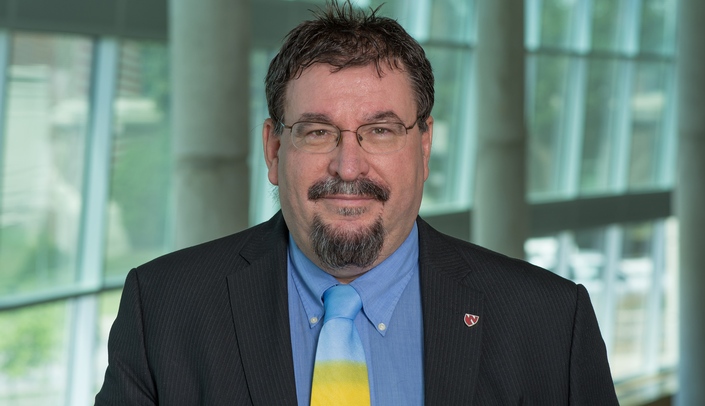The Munroe-Meyer Institute displayed steady growth over the last fiscal year and leadership is committed to continuing that upward trend.
Director Karoly Mirnics, MD, PhD, spoke about the need to continue growing the organization during his annual “State of the Institute” address on March 30.
“The future for us is always grow, grow, grow as much as you can,” Dr. Mirnics said.
One possibility for growth is bringing primary care services to the institute. Dr. Mirnics said leaders will explore avenues to make that happen.
“Some of our clients also get sore throats and sick ears,” he said. “Someone has to take care of them. We would be in a perfect position to provide it in our building.”
Other areas for growth include working to designate the institute as a basic life support and first aid training site. Dr. Mirnics also spoke about creating career laddering and salary adjustment. The creation of a pipeline for institute employment was another goal, he said.
In the past year, more than 500 employees provided about 90,000 services to clients within the institute’s locations across the state and country.
The institute’s revenue sources were “well-balanced,” Dr. Mirnics said, pointing to a budget of more than $41 million. Of that, more than $18 million came from federal, state and local grants along with $6.2 million in philanthropy.
“Fiscally, we are very stable at the current time, which is no small achievement during pandemic years,” Dr. Mirnics said.
But the institute does face some hurdles, including inflation and cost-of-living increases, potential state appropriation budget cuts as well as recruitment and retention.
Dr. Mirnics pointed to other highlights from 2022, including:
Notable changes.
The last year saw the expansion of centralized scheduling, a new customer satisfaction survey and strengthened compliance monitoring in the health clinics.
Fremont ACT Clinic
A project that would see a new care outlet in Fremont, Nebraska, has funding in place, including a grant from the Behavioral Health Education Center of Nebraska, to start operational and training portions of the facility. But officials are still seeking philanthropic support to aid in finding a brick-and-mortar location, Dr. Mirnics said. “I am cautiously optimistic we will be able to achieve that,” he said.
COVID-19
The end of the public emergency for COVID-19 in early May could mean no longer providing some services via telehealth if those services are no longer reimbursable by third-party providers, Dr. Mirnics said. On April 3, masks became optional at MMI, he said, as it continues to follow the guidance of UNMC’s clinical partner, Nebraska Medicine, on safety procedures in clinical areas.
New clinical programming
Dr. Mirnics pointed to expansion of Camp Munroe and the addition of occupational therapy and physical therapy summer camps. Also new will be an aquatic program, an epilepsy clinic, a neurometabolomics clinic and audiology services. Other changes include becoming a state-approved respite care provider, starting fluency services, and starting pediatric outpatient services following multi-organ transplants at the Nebraska Medical Center.
Leadership changes
Dr. Mirnics acknowledged a handful of leadership changes through the organization and discussed ongoing searches for directors of physical therapy, speech language pathology, genetic medicine and psychology.
Waitlists
Reducing the time prospective clients spend on wait lists will be a priority for institute leaders, Dr. Mirnics said. “The need is endless. The resources are limited,” he said. “We cannot do a miracle that will get rid of our waiting lists tomorrow.” Dr. Mirnics said they will “chip away” at waitlists to meet the growing demand.
